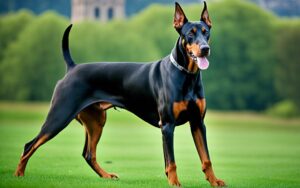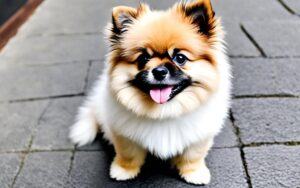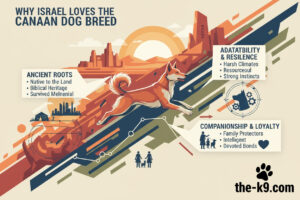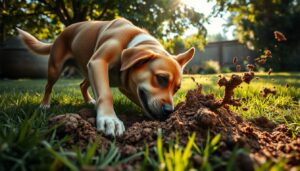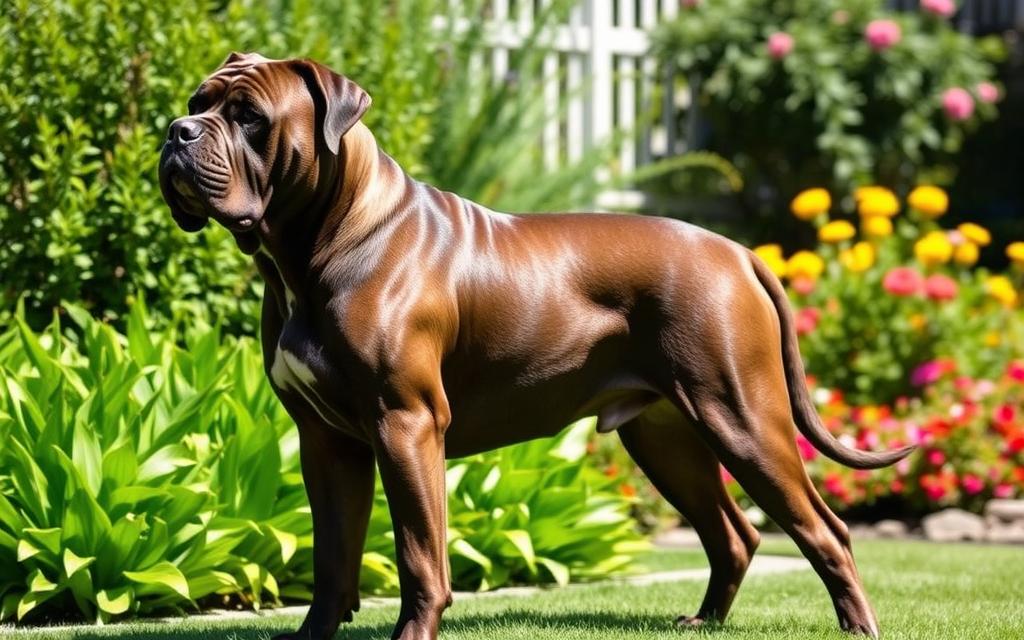
Did you know that 80% of Cane Corso dogs weigh between 80-120 pounds? They’re called “King Corsos” by dog lovers. These Italian mastiffs are not just big dogs. They have a rich history of guarding and loyalty.
The Cane Corso is a top-notch Italian mastiff breed. They are strong and smart. These guard dogs have won the hearts of many dog lovers. Their strong build and protective nature make them great pets for those who know how to handle them.
Originally from Italy, Cane Corso dogs were once Roman war companions. Now, they protect families. Their ability to connect with humans makes them stand out among other large dogs. They are a unique and popular breed.
Key Takeaways: Cane Corso Dogs
- Massive dogs weighing 80-120 pounds with impressive guardian instincts
- Rich historical background tracing back to ancient Roman times
- Exceptional family protectors requiring proper training and socialization
- Recognized by the American Kennel Club in 2010
- Versatile working dogs with strong physical and mental capabilities
- The Ancient Origins of the Italian Mastiff
- Physical Characteristics of the Cane Corso
- Understanding the Cane Corso Temperament
- Training Requirements for Dogs Corso
- Exercise and Activity Needs Cane Corso Dogs
- Health Considerations and Lifespan Cane Corso Dogs
- Nutrition and Feeding Guidelines
- Grooming and Maintenance
- Socialization and Family Integration
- Living Requirements and Space Needs Cane Corso Dogs
- Cane Corso Dogs Choosing a Cane Corso Puppy
- FAQ
- FAQ
The Ancient Origins of the Italian Mastiff
The Cane Corso breed has a long history that goes back to ancient times. These powerful dogs come from the legendary war dogs of the Roman Empire. They have a long tradition of being working dogs.
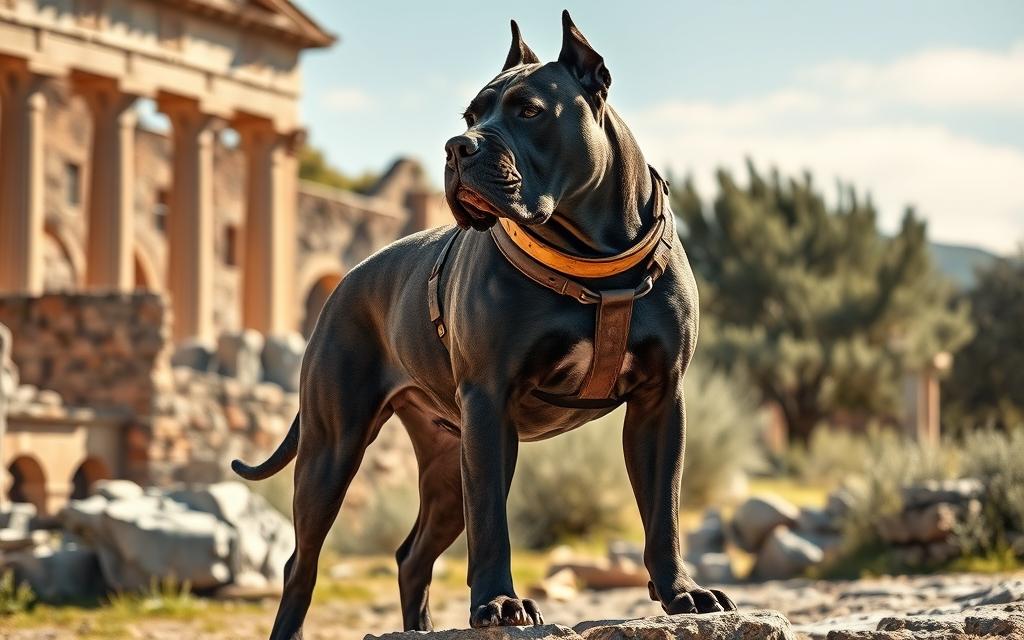
The Cane Corso’s roots go back to the canis pugnaces, huge dogs that fought alongside Roman legions. These dogs were not just military tools. They were a key part of Roman military strategy.
From Roman War Dogs to Modern Guardians
After battles, these dogs became important on Italian farms. They were great at:
- Hunting large game like wild boar
- Protecting livestock
- Guarding rural properties
- Assisting farmers with various tasks
Near Extinction and Revival in the 1970s
In the mid-20th century, the Cane Corso faced big challenges. World War II and the rise of mechanical farming almost wiped them out.
| Period | Breed Status | Key Events |
|---|---|---|
| Post-WWII | Near Extinction | Reduced agricultural work |
| 1970s | Revival Begins | Breed enthusiasts locate remaining dogs |
| 1983 | First Breed Club | Society Amorati Cane Corso founded |
AKC Recognition and Modern Status
The hard work of breed lovers paid off. In 2010, the American Kennel Club recognized the Cane Corso. Today, these dogs are valued for their smarts, loyalty, and protective nature.
Physical Characteristics of the Cane Corso
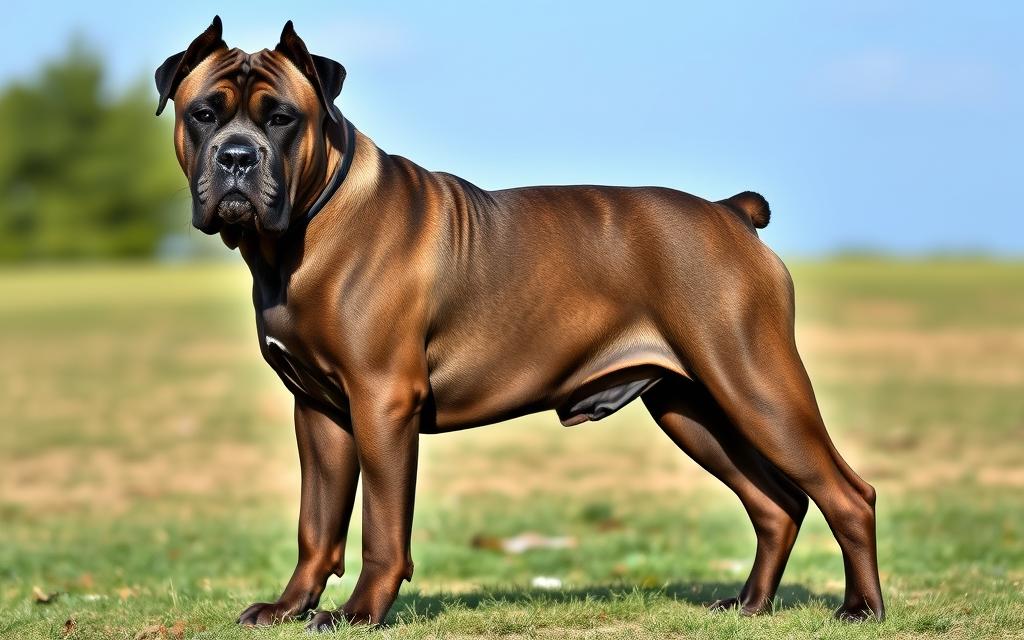
The Cane Corso is a stunning example of large breed dogs. They have a strong and athletic build. As an Italian mastiff, they show off their muscular strength and commanding presence.
Adult Cane Corsos have unique physical traits that make them stand out:
- Height range for males: 24-28 inches
- Height range for females: 23-26 inches
- Male weight: 99-110 pounds
- Female weight: 88-99 pounds
Their coat comes in several stunning colors:
- Black
- Fawn
- Brindle
- Red
- Gray
The breed’s structure shows its working dog roots. Broad chests, wide heads, and muscular frames are key features. Their short double coat protects them and makes them look sleek and athletic.
Cane Corsos have an impressive bite force of 700 PSI. Their alert, intelligent eyes and square muzzle make them easily recognizable. They are truly impressive among large breed dogs.
Understanding the Cane Corso Temperament
The Cane Corso is a remarkable loyal companion dog. They have a strong body and an amazing temperament. This makes them stand out as excellent family protection dogs.
Cane Corsos are very loyal to their families. They have a strong protective instinct. This instinct helps keep their loved ones safe.
Loyalty and Family Devotion
- Exhibit extremely high affection levels toward family members
- Form strong emotional bonds with owners
- Prefer constant companionship and interaction
- Thrive on close family connections
Protective Instincts and Guardian Nature
Cane Corsos are natural guard dogs. They can spot potential threats easily. Their calm nature helps them stay alert without getting too excited.
| Characteristic | Rating |
|---|---|
| Protective Instinct | High |
| Aggression Level | Moderate |
| Family Friendliness | Excellent |
Intelligence and Trainability
Cane Corsos are very smart. They are easy to train for those who know how. Their intelligence helps them learn complex tasks without getting upset.
- Respond exceptionally well to consistent training
- Require mental stimulation to prevent boredom
- Adapt quickly to structured learning environments
People thinking of getting a Cane Corso need to know they need lots of training and socialization. With the right care, they can be amazing loyal companions.
Training Requirements for Dogs Corso
Training a Cane Corso needs special methods that fit their strong guard dog nature. These loyal dogs need patient, consistent training from the start. Russell Hartstein says Cane Corsos are tough for new dog owners, so knowing dog behavior is key.
The socialization window for a Cane Corso puppy lasts until about 16 weeks. Owners must focus on socializing them well to avoid aggression or fear.
Key Training Strategies:
- Start obedience training early
- Use positive reinforcement methods
- Focus on essential commands like recall and stop
- Maintain consistent training routines
Recommended Training Techniques:
| Training Aspect | Recommended Approach |
|---|---|
| Socialization | Expose puppy to various people, animals, and environments |
| Obedience | Use food-motivated positive reinforcement |
| Boundary Setting | Establish firm leadership without aggression |
The Cane Corso Association of America suggests crate training to help puppies learn household rules. Adolescence, around six months, is a key training time when dogs test limits. It’s vital to keep training consistent, provide daily exercise, and mental challenges for these smart guard dogs.
Remember, 90% of behavioral problems come from how owners manage them. With the right training, Cane Corsos can be amazing family pets, great at protection and showing love.
Exercise and Activity Needs Cane Corso Dogs
Cane Corso dogs are powerful and love to stay active. They need regular exercise to stay healthy and happy. These Italian mastiffs are great companions for active people.
It’s important to know how much exercise a Cane Corso needs. They are full of energy and need both physical and mental challenges.
Daily Exercise Requirements
Adult Cane Corsos need about 60 minutes of exercise each day. It’s best to split this into two 30-minute sessions. Their exercise routine should include:
- Brisk walking or jogging
- Interactive play sessions
- Structured training activities
- Engaging outdoor games
Mental Stimulation Activities
Mental challenges are key for these smart dogs. Try activities that test their thinking:
- Puzzle toys with hidden treats
- Obedience training exercises
- Scent work challenges
- Interactive tracking games
Outdoor Activities and Sports
| Activity Type | Duration | Intensity |
|---|---|---|
| Running | 20-30 minutes | High |
| Swimming | 15-20 minutes | Low Impact |
| Agility Training | 30-45 minutes | Moderate to High |
| Fetch | 15-20 minutes | High Energy |
Remember, exercise needs change with age, health, and personality. Always talk to a vet to create the best exercise plan for your Cane Corso.
Health Considerations and Lifespan Cane Corso Dogs
The Cane Corso, an Italian mastiff, lives for 9-12 years. Like many large dogs, they face health challenges. Owners need to know about these issues.
Cane Corsos can get sick with several problems. They need regular vet visits and care. Some common health issues include:
- Joint Problems: Hip and elbow dysplasia can make moving hard
- Potential for epilepsy, usually starting at 3 years old
- Skin conditions like demodectic mange
- Eyelid problems such as cherry eye and entropion
- Risk of bloat and gastric dilatation-volvulus (GDV)
To keep Cane Corsos healthy, a few steps are key. Keeping them at a healthy weight is important. They should eat small meals often to avoid bloat. Also, joint supplements help with mobility.
Genetic tests and careful breeding are vital. When looking for a breeder, choose one who tests for health problems. This helps avoid many issues.
Regular vet visits, a good diet, and exercise are essential. Catching health problems early is also important. This way, Cane Corsos can live long, happy lives.
Nutrition and Feeding Guidelines
Proper nutrition is key for large breed dogs like the Cane Corso. As an Italian mastiff, they have special dietary needs. Knowing how to feed them helps keep them healthy and avoids nutritional problems.
Daily Caloric Requirements
Dogs corso need different amounts of food at different times in their lives. An adult Cane Corso needs about 2000-2200 kcal a day. This depends on how active they are and their metabolism.
- Puppies (2-6 months): 3-4 cups of high-quality puppy food daily
- Adolescents (6-12 months): 4-6 cups split into 2-3 meals
- Adult dogs: 4-6 cups of adult dog food per day
- Senior dogs (8+ years): 3-5 cups of senior dog food
Meal Scheduling and Portion Control
It’s important to control how much food they eat to avoid obesity. Feed them two or three times a day. This helps with digestion and prevents bloating.
| Life Stage | Meals per Day | Portion Size |
|---|---|---|
| Puppies | 3-4 times | 1-1.5 cups per meal |
| Adults | 2-3 times | 2-3 cups per meal |
| Seniors | 2 times | 1.5-2.5 cups per meal |
Dietary Considerations for Different Life Stages
Italian mastiff nutrition focuses on protein and quality. Look for dog food with 27-38% protein. Avoid fillers like corn. Good nutrition helps with muscle growth and health.
Talking to a vet can help make a diet plan for your Cane Corso. This ensures they get the right food at every stage of their life.
Grooming and Maintenance
Keeping an Italian mastiff’s coat clean needs regular care. The Cane Corso, with its short, dense coat, needs a special grooming routine. This ensures they look and feel great.
Grooming your Cane Corso involves several key practices. These practices keep them healthy and looking good:
- Daily brushing during shedding seasons
- Regular coat maintenance
- Comprehensive hygiene routine
Coat Care Essentials
The Cane Corso sheds all year, but more in spring. Consistent brushing helps manage loose hair and distribute natural skin oils. It’s best to use grooming tools made for large breed dogs:
- Rubber curry brush
- Slicker brush
- De-shedding tools
Bathing and Hygiene
Bathing a Cane Corso should be done moderately. Groomers recommend:
| Grooming Task | Frequency |
|---|---|
| Bathing | Every 6-8 weeks |
| Nail Trimming | Every 2-3 weeks |
| Teeth Brushing | 2-3 times weekly |
| Ear Cleaning | Weekly |
Use hypoallergenic shampoos with natural ingredients like oatmeal or aloe vera when bathing. These keep the skin healthy and prevent irritation.
Special Grooming Considerations
Wrinkles and skin folds need extra care. They can harbor bacteria. Clean these areas well to avoid infections. Remember, Cane Corsos are not hypoallergenic and shed. Regular grooming is key for managing shedding and keeping the coat healthy.
Socialization and Family Integration
Cane Corsos are strong family protectors that need careful socialization. This helps them adjust well and be loyal companions. Their natural guard instincts make early training key for balanced behavior.
Early Socialization Importance
Socialization is vital for a well-behaved guard dog. Experts say start it early, during puppyhood, for a stable temperament. Key periods include:
- Exposure to diverse people and environments
- Controlled interactions with other animals
- Positive reinforcement training techniques
- Consistent behavioral guidance
Interaction with Children and Other Pets
Cane Corsos are naturally protective but need careful introduction to kids and pets. Their size and strong instincts require careful handling.
| Interaction Type | Recommended Approach |
|---|---|
| Children | Supervised interactions, teaching gentle play |
| Other Dogs | Neutral territory introductions, controlled meetings |
| Small Pets | Early socialization to manage prey drive |
Managing Protective Behaviors
Proper training is key to managing a Cane Corso’s protective instincts. Consistent obedience training and positive reinforcement are essential. Professional training classes offer structured learning environments.
Vets suggest puppy socialization classes and gradual exposure to various stimuli. Neutering or spaying can also reduce possessive behaviors. This makes these remarkable family companions easier to integrate.
Living Requirements and Space Needs Cane Corso Dogs
Dogs corso are large and need a lot of space. They do well in places that keep them active and happy. It’s important to know what they need in a home.
Ideal living conditions for a Cane Corso include:
- A home with a secure, fenced yard
- Indoor space that allows comfortable movement
- Proximity to walking areas and exercise spaces
- Quiet areas for rest and relaxation
Even though they can live in apartments, they need a lot of exercise and mental play. Owners should plan for:
- Minimum 1-2 hours of daily exercise
- Multiple walking sessions
- Interactive play and training
- Mental stimulation activities
The amount of space a Cane Corso needs depends on their energy and your lifestyle. They usually need about 4-5 square feet of indoor space per pound of body weight.
It’s key for owners to train them well, follow house rules, and create a structured home. These dogs need owners who can spend time with them and meet their needs.
While it’s tough, it’s possible to raise a Cane Corso in different homes with the right planning and understanding of their needs.
Cane Corso Dogs Choosing a Cane Corso Puppy
Choosing the right Cane Corso puppy is a big decision. These Italian mastiffs are known for being loyal and loving. They need a careful selection process.
Reputable breeders focus on health, character, and trainability. They ask lots of questions about your family and lifestyle. This helps find the best match for you.
Look for puppies that are confident and curious. Breeders usually let you pick your puppy at 5-6 weeks. This lets you see their temperament.
Puppies should be balanced, not too shy or aggressive. It’s interesting to know that some small puppies can grow big later.
Health checks are key when picking a puppy. Breeders test for hip and elbow issues. Puppies should stay with their litter until they’re a bit older.
Male puppies might grow bigger than females. They could be 15-20 pounds heavier and taller.
Getting a Cane Corso means big responsibilities. You’ll need to socialize, train, and understand their needs. It’s a big commitment, but very rewarding.
FAQ
Are Cane Corsos good family dogs?
How much exercise does a Cane Corso need?
Are Cane Corsos difficult to train?
What health issues are common in Cane Corsos?
Do Cane Corsos get along with other pets?
How much space do Cane Corsos need?
Are Cane Corsos good guard dogs?
How much do Cane Corso puppies cost?
FAQ
Are Cane Corsos good family dogs?
Cane Corsos can be great family pets if they’re well-trained and socialized. They are loyal and loving to their family. But, they need owners who can handle their size and protective nature.
How much exercise does a Cane Corso need?
They need at least 30 minutes of active play every day. Adult dogs can run or hike a lot, but puppies should avoid hard exercises. They also need brain games and puzzles to keep them smart.
Are Cane Corsos difficult to train?
Cane Corsos are smart but can be hard to train. They need a firm, consistent handler. Positive training methods work best, and training should start early. They need a leader who can guide them without letting them dominate.
What health issues are common in Cane Corsos?
They often face hip dysplasia, joint issues, bloat, cherry eye, and epilepsy. They live about 10-11 years and might have allergies or food sensitivities. Regular vet visits and good food are key to their health.
Do Cane Corsos get along with other pets?
They can be tough with other dogs and have a strong prey drive. This makes them hard in homes with other pets. Early socialization is vital to teach them to get along with others. Always watch them around smaller pets.
How much space do Cane Corsos need?
They can live in apartments if they get enough exercise. But, a house with a yard is best. They need room to move and should not be left outside for too long. They love being with people and need a safe place.
Are Cane Corsos good guard dogs?
Yes, they are excellent guard dogs. Their size, smarts, and loyalty make them natural protectors. But, they need training to know when to be alert and when to relax.
How much do Cane Corso puppies cost?
Puppies cost between
FAQ
Are Cane Corsos good family dogs?
Cane Corsos can be great family pets if they’re well-trained and socialized. They are loyal and loving to their family. But, they need owners who can handle their size and protective nature.
How much exercise does a Cane Corso need?
They need at least 30 minutes of active play every day. Adult dogs can run or hike a lot, but puppies should avoid hard exercises. They also need brain games and puzzles to keep them smart.
Are Cane Corsos difficult to train?
Cane Corsos are smart but can be hard to train. They need a firm, consistent handler. Positive training methods work best, and training should start early. They need a leader who can guide them without letting them dominate.
What health issues are common in Cane Corsos?
They often face hip dysplasia, joint issues, bloat, cherry eye, and epilepsy. They live about 10-11 years and might have allergies or food sensitivities. Regular vet visits and good food are key to their health.
Do Cane Corsos get along with other pets?
They can be tough with other dogs and have a strong prey drive. This makes them hard in homes with other pets. Early socialization is vital to teach them to get along with others. Always watch them around smaller pets.
How much space do Cane Corsos need?
They can live in apartments if they get enough exercise. But, a house with a yard is best. They need room to move and should not be left outside for too long. They love being with people and need a safe place.
Are Cane Corsos good guard dogs?
Yes, they are excellent guard dogs. Their size, smarts, and loyalty make them natural protectors. But, they need training to know when to be alert and when to relax.
How much do Cane Corso puppies cost?
Puppies cost between $1,500 to $4,000 from good breeders. Prices depend on the dog’s lineage, the breeder’s reputation, and health checks. Owners should also plan for ongoing costs like training, food, vet bills, and health treatments.
,500 to ,000 from good breeders. Prices depend on the dog’s lineage, the breeder’s reputation, and health checks. Owners should also plan for ongoing costs like training, food, vet bills, and health treatments.








